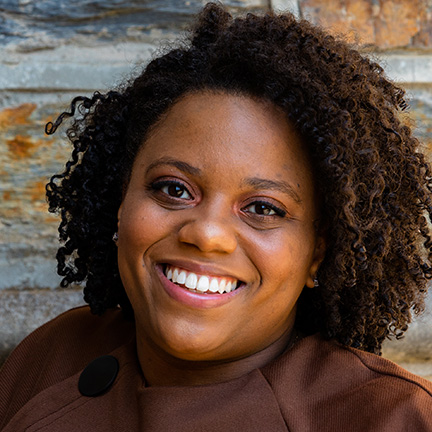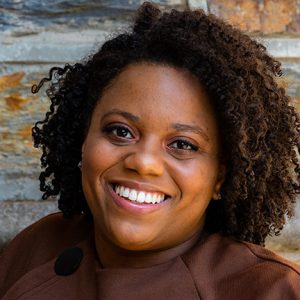
February 1, 2022
The Diversity, Equity & Inclusion Coordinator leads department efforts in assessing current DEI practices and implementing initiatives. Tasked with developing a department vision, goals, and plan within the department, this position was established in 2017, affirming the department’s commitment to a more inclusive and equitable environment for students, faculty and staff.

Briana joined the department in November 2021, previously she worked in Residence Life, as a Residence Coordinator at Duke University. At Duke, she took on a number of departmental projects including serving as the Student Staff Recruitment, Selections, and Training Lead, Professional Staff Training Lead, and serving on the department’s Cultural Fluency committee. She has demonstrated her commitment to DEI by integrating anti-racism, bias, and dialogue facilitation training into her work as a pillar of student development.
Briana is originally from Reisterstown, MD. She holds a B.S. in Psychology from New York Institute of Technology, and a M.A. in College Student Personnel from Bowling Green State University.
As we welcome Briana to UNC CS, we asked her to share her vision for the position and ways we can best support DEI efforts within the department.
Today, we often witness discussions of “DEI” in workplace & education settings, but what exactly is DEI work in general?
First, I think it’s important to acknowledge that Diversity, Equity, and Inclusion work was born out of the oppression of and discrimination towards Black, Indigenous and People of Color (BIPOC), and other historically resilient groups. We first must acknowledge that there is a problem. The goal of DEI work is not to erase years of oppression, but to acknowledge the hundreds of years of resilience that underrepresented groups have displayed through focusing on representation, access to resources, advocacy, and support.
Oftentimes DEI work is an uphill battle – we cannot expect to unlearn biases and stereotypes in one or two training sessions. DEI work is an acknowledgement that there are groups who simply have not been given opportunities, and thus there should be a concerted and consistent effort to address the systemic issues that are put in front of these groups on a daily basis. This work requires emotional intelligence, reflection, and dedication. DEI is not just implementing processes. It is learning, speaking up, and committing to a personal journey.
Why are these efforts important to UNC CS and to the future of tech?
It is commonly understood that STEM fields are dominated by white, cisgender, males. UNC CS has done a great job in combating representation, with 31% of women undergraduates in CS, and the tech field overall continues to make strides in supporting underrepresented identities, however there is always more work to be done. As people evolve, identities evolve – and, almost as quickly as technology. This means that our understanding of what support looks like, what groups are successful, and who is making those decisions must also evolve. It means that our students and faculty are creating technology and executing research that serves this ever-changing global society.
The future leaders in tech are those with diverse perspectives, ideas, and experiences – equipt to solve the world’s most difficult problems. They are students who come from low income households, they are first-generation college educated, they are men and womxn of color, they are gender non-binary, and the list goes on. Those future leaders reside in our community, and it is our responsibility to seek change beyond representation and support. It is important to consider ways to improve retention and the creation of opportunities for underrepresented groups to advance in the field. The work begins here and continues with its application in research and in student development.
What opportunities exist to support DEI efforts within the department?
There are so many opportunities! As I get settled into the role, I am committed to understanding the current climate of the department and the tech field. There are opportunities for community building and storytelling to ensure that students with historically excluded racial identities can see themselves as contributing members of the department and the field. The LGBTQ+ community is also growing, and it’s important to make sure those identities are represented and that we create opportunities for further visibility. I am also hoping to have more discussions about the role of intersectionality of identities, both in the department and the field.
Starting in Fall 2022, we will be developing an Inclusive Alumni Mentoring Program in Computer Science, supporting students from historically excluded identities in tech and computer science. We also will be working on revamping our DEI package for corporate partners to support new DEI initiatives, affinity group programming, and K-12 engagement. We hope to work with companies whose values are in alignment with what our students are looking for in their future professional plans. I also hope to utilize history to inform our future. We have designed a survey specifically for alumni, to capture a better understanding of their experiences within the department, helping to develop a picture of the broader climate.
And most importantly, I want to engage with folks to do the work, increase education, and implement equitable and inclusive practices wherever possible! I am always happy to meet with anyone to discuss specific programs or initiatives they would be interested in supporting. Volunteering with existing programs such as queer_hack, Pearl Hacks, and AfroPix is an excellent way to support DEI efforts as it relates to the student and community experience.
Interested in learning more? Connect with Briana at brianas@cs.unc.edu.
Interested in volunteering for the mentoring program? Fill out the mentor program interest form.
Help us to gather information, share your experiences by completing the Alumni Climate Survey here.
